大学英语期末考试题型及分值 - 浙江万里学院基础学院大学
- 格式:doc
- 大小:44.50 KB
- 文档页数:4
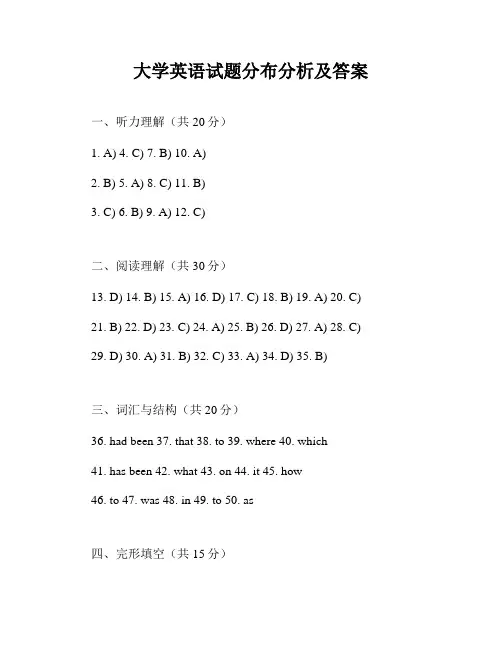
大学英语试题分布分析及答案一、听力理解(共20分)1. A) 4. C) 7. B) 10. A)2. B) 5. A) 8. C) 11. B)3. C) 6. B) 9. A) 12. C)二、阅读理解(共30分)13. D) 14. B) 15. A) 16. D) 17. C) 18. B) 19. A) 20. C) 21. B) 22. D) 23. C) 24. A) 25. B) 26. D) 27. A) 28. C) 29. D) 30. A) 31. B) 32. C) 33. A) 34. D) 35. B)三、词汇与结构(共20分)36. had been 37. that 38. to 39. where 40. which41. has been 42. what 43. on 44. it 45. how46. to 47. was 48. in 49. to 50. as四、完形填空(共15分)51. C) 52. B) 53. A) 54. D) 55. C) 56. B) 57. A) 58. D) 59. C) 60. B)61. D) 62. A) 63. B) 64. C) 65. A)五、翻译(共15分)66. 他不仅是一位伟大的科学家,而且是一位杰出的作家。
67. 由于天气恶劣,我们不得不推迟了出发。
68. 他没有意识到自己的错误,这让我们感到惊讶。
69. 她决定放弃工作,去国外学习。
70. 这个项目的成功归功于团队的共同努力。
【试题分析】一、听力理解本部分考查学生对英语听力材料的理解能力。
共20题,每题1分,满分20分。
包括短对话、长对话和短文理解三种题型。
1. 短对话:共10题,每题1分。
主要考查学生对日常英语对话的理解能力。
通过听对话,学生需要从四个选项中选择正确答案。
2. 长对话:共5题,每题1分。
主要考查学生对较长英语对话的理解能力。
通过听对话,学生需要从四个选项中选择正确答案。
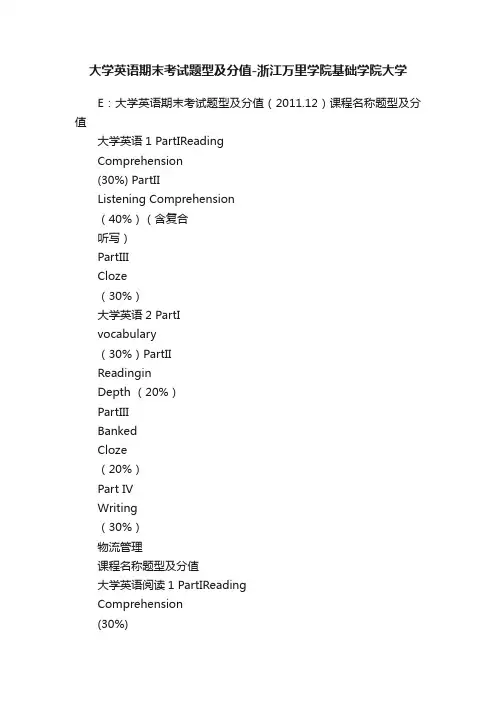
大学英语期末考试题型及分值-浙江万里学院基础学院大学E:大学英语期末考试题型及分值(2011.12)课程名称题型及分值大学英语1 PartIReadingComprehension(30%) PartIIListening Comprehension(40%)(含复合听写)PartIIICloze(30%)大学英语2 PartIvocabulary(30%)PartIIReadinginDepth (20%)PartIIIBankedCloze(20%)Part IVWriting(30%)物流管理课程名称题型及分值大学英语阅读1 PartIReadingComprehension(30%)PartIIReadinginDepth (30%)PartIIIvocabulary(40%)大学英语听说1 PartIOralTest(60%)PartIIListeningComprehension(40%)(含复合听写)大学英语写作1 PartIBanked Cloze(30%)PartIICloze(40%)PartIIIWriting(30%)教育创新班课程名称题型及分值大学英语阅读(一)PartIReading Comprehension(30%)PartIIReadinginDepth (30%)PartIIIvocabulary(40%)大学英语听说(一)PartI OralTest(60%)PartIIListening Comprehension (40%)(含复合听写)大学英语写作(一)PartI Writing(30%)PartIIBanked Cloze (30%)PartIIICloze(40%)艺术课程名称题型及分值大学英语艺术1 PartI Writing(30%)PartIIvocabulary(40%)PartIIIReading Comprehension(30%)大学英语艺术2 PartI Readingin Depth (30%)PartII Listening Comprehension (30%)PartIIICloze(40%)。
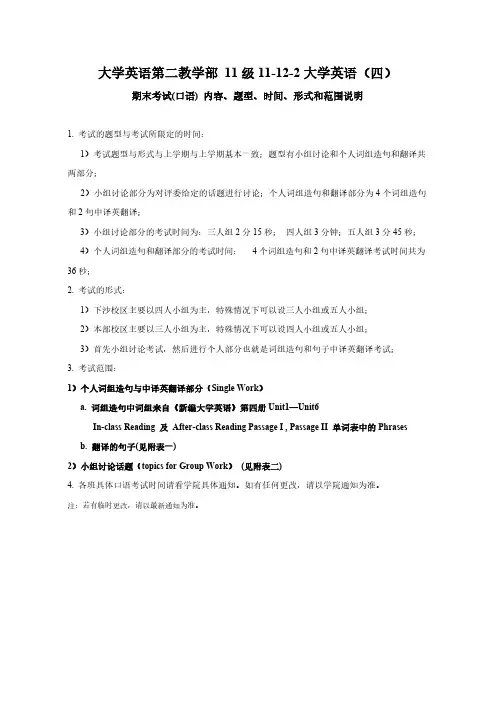
大学英语第二教学部11级11-12-2大学英语(四)期末考试(口语) 内容、题型、时间、形式和范围说明1. 考试的题型与考试所限定的时间:1)考试题型与形式与上学期与上学期基本一致;题型有小组讨论和个人词组造句和翻译共两部分;2)小组讨论部分为对评委给定的话题进行讨论;个人词组造句和翻译部分为4个词组造句和2句中译英翻译;3)小组讨论部分的考试时间为:三人组2分15秒;四人组3分钟;五人组3分45秒;4)个人词组造句和翻译部分的考试时间:4个词组造句和2句中译英翻译考试时间共为36秒;2. 考试的形式:1)下沙校区主要以四人小组为主,特殊情况下可以设三人小组或五人小组;2)本部校区主要以三人小组为主,特殊情况下可以设四人小组或五人小组;3)首先小组讨论考试,然后进行个人部分也就是词组造句和句子中译英翻译考试;3. 考试范围:1)个人词组造句与中译英翻译部分(Single Work)a. 词组造句中词组来自《新编大学英语》第四册Unit1—Unit6In-class Reading 及After-class Reading Passage I , Passage II 单词表中的Phrasesb. 翻译的句子(见附表一)2)小组讨论话题(topics for Group Work)(见附表二)4. 各班具体口语考试时间请看学院具体通知。
如有任何更改,请以学院通知为准。
注:若有临时更改,请以最新通知为准。
浙江工商大学11级11-12-2期末口语考试内容附表一:Translation1.活泼的举止对一个四岁孩子来说是正常的。
Lively behavior is normal for a four-year-old child.2.她总想成为注意的焦点。
She always wants to be the focus/center of attention3.如果我们提前买票是不是会便宜点儿?Is it cheaper if we buy our tickets in advance?4.速度快的车对我很有吸引力但我买不起。
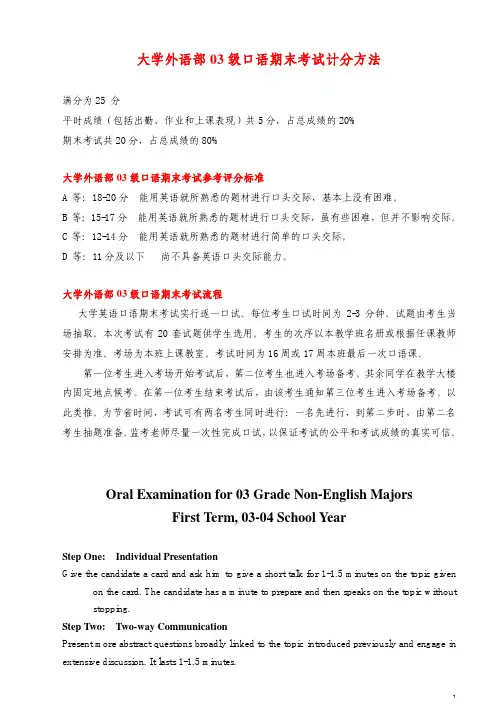
大学外语部03级口语期末考试计分方法满分为25 分平时成绩(包括出勤、作业和上课表现)共5分,占总成绩的20%期末考试共20分,占总成绩的80%大学外语部03级口语期末考试参考评分标准A等:18-20分能用英语就所熟悉的题材进行口头交际,基本上没有困难。
B等:15-17分能用英语就所熟悉的题材进行口头交际,虽有些困难,但并不影响交际。
C等:12-14分能用英语就所熟悉的题材进行简单的口头交际。
D等:11分及以下尚不具备英语口头交际能力。
大学外语部03级口语期末考试流程大学英语口语期末考试实行逐一口试。
每位考生口试时间为2-3分钟。
试题由考生当场抽取。
本次考试有20套试题供学生选用。
考生的次序以本教学班名册或根据任课教师安排为准。
考场为本班上课教室。
考试时间为16周或17周本班最后一次口语课。
第一位考生进入考场开始考试后,第二位考生也进入考场备考。
其余同学在教学大楼内固定地点候考。
在第一位考生结束考试后,由该考生通知第三位考生进入考场备考。
以此类推。
为节省时间,考试可有两名考生同时进行:一名先进行,到第二步时,由第二名考生抽题准备。
监考老师尽量一次性完成口试,以保证考试的公平和考试成绩的真实可信。
Oral Examination for 03 Grade Non-English MajorsFirst Term, 03-04 School YearStep One: Individual PresentationGive the candidate a card and ask him to give a short talk for 1-1.5 minutes on the topic given on the card. The candidate has a minute to prepare and then speaks on the topic without stopping.Step Two:Two-way CommunicationPresent more abstract questions broadly linked to the topic introduced previously and engage in extensive discussion. It lasts 1-1.5 minutes.1. What’s your personal strength and weakness?2. Tell me something about your hobbies. Describe them in detail.3. How will you spend the four years in this university?4. Do you have any idol, who he is, and what can you learn from him or her?5. What does success mean to you? / People often say that: “success comes out of diligence.”What do you think of it?1. What’s your opinion on your hometown?2. Do you think in which areas dose your hometown need to improve?3. How is the living environment in your hometown?4. Which do you prefer, living in the city or living in the country?5. If you can choose, what kind of place you would like to live, study and work?1. Do you remember your parents’ birthday? What will your do on your parents’ birthday?2. How dose your family celebrate the Spring Festival?3. What’s your opinion on the single-parent family?4. What are the major factors in keeping a harmonious/happy family?5. Who is the most influential person in your life? Cite a few examples to support your choice.1. What is the relationship between sports and health?2. The Olympic Game will be held in China in 2008. What do you think will the Game bring tous?3. What are the differences between watching a game on TV at home and at site?4. Tell me one of the most memorable matches that you still remember now?1. What did you think the university life would be before you study here?2. What’s your ideal university life?3. What aspects do you think the university needs to improve in future?4. If you can choose, which university is your favorite one, why?5. Which do you prefer, studying in China or studying in a foreign country?1.How do you think of Ningbo?2.Are you satisfied with the teaching staff and their teaching methods in Ningbo University? 3.What do you think of the social activities on campus in this university?4.How do you like your present major? If you were given anther chance, which major would you choose in this university?5.If you are going to further your study after graduation, will you still choose Ningbo University for a master’s degree?1.Can you tell me your reasons for attending college?2.What is your standard for the success in college?3.Have you ever set yourself a defined goal for the first year success?4.What is the biggest problem you’ve come across to achieve your first year success? 5.What do you think is more important for a college student, academic achievements or social experience?1.Do you think to be a private tutor is a suitable job for a college student?2.In your opinion, what are the other appropriate jobs for college students?3.Is salary the main reason for you to take a part-time job?4.What do you care most in a part-time job?5.Do you think students can learn more outside classroom by taking a part-time job?1.What are the differences between your present college life and the college life in your imagination?2.Have you got used to the study and life in university yet?3.Is there anything you don't like about campus life?4.Should students be given more free time in college? Why or Why not?5.Do you think study is the most important task for a university student?1.Which way of living do you prefer, to stay in dorm with your roommates or to stay at home with your parents?2.What do you usually do in your dorm?3.Do you think dorm is a good place for study/rest? Why or why not?4.What are the criteria for an ideal dorm in your opinion?5.How can you get along well with the roommate whose life style is different from yours?1. College life is different from your middle school life. What do you think of your newfriends here? Is it more difficult to get along with them? Why?2. Describe the personality of one of your good friends.3. Is there the generation gap between you and your parents? How to bridge this gap?4. A friend in need is a friend indeed. How do you think of this proverb?1.How will your celebrate your birthday, holding a party or staying alone? Why?2.Do you remember your parent’s birthday? Have your ever celebrated a birthday for your parent? Chinese are shy to show their love to their relatives. Is it necessary to express your love to your parents?3.Nowadays, many college students run short of money as a result of buying birthday presents for their classmates and friends. How do you think of it?4. Western customs have influenced Chinese people and become a part of Chinese culture in recent years. Cite some examples in this case.1. You will be adult at the age of 20. What will you do to lessen your parents’ burden?2. What do you want to do most at 20? Have you a plan for four years’ college life? What is it?3. Youth is golden time in one’s life. How do you comment on this saying?4. Compared with the old, what are the advantages and disadvantages youngsters have?1. Which do you prefer, eating alone or eating with your classmate(s)? Why?2. What are regarded as good/bad manners at a restaurant?3. Are there any differences between Chinese foods and western foods? What are they?4. Do you talk while eating? Is it a good habit in your opinion? Why?1. Which do you like, Chinese foods or western foods? Why? Have you ever been to a westernrestaurant?2. When you invite a foreigner to dinner, how will you treat the guest to show your hospitalitybut not to embarrass him/her?3. When you go to a restaurant with a friend of opposite sex, who will pay the bill? Why?4. When invited to a dinner, how do you feel if the hosts always persuade you to eat more?1.Could you introduce the specific dishes you have enjoyed in that dinner party?2.Besides the dishes, what else did you enjoy, what are they?3.If you sit next to a western guest from US or UK, would you feel uneasy? Why or why not?4. At parties, some people can not control themselves after drinking alcohol. How does alcohol influence our life?1. Could you briefly describe an experience in a fast food restaurant?2. What do you think attracts you to go and eat in a fast food restaurant?3. If you are the manager of a fast food restaurant, how to win the market share as much aspossible?4.Kids love going to fast food restaurant. What do you think are the reasons for it?1. In nowadays China, even average pop stars earn much more than professors in the bestuniversities. How do you think of this social phenomenon?2. Do you want to be a popular star in the future? Why and why not?3. How can popular stars influence the youngsters?4. What kind of popular stars can be held up as models for the young people?1. Introduce your favorite TV program and explain why you like it most.2. How can we make the full use of TV set, this modern machine?3. Are there any similarities and differences between TV and books?4. Do you think that TV is sometimes misleading? Why?1. What do you think of the doctors and nurses in the hospital? Are you satisfied with them?2. Do you believe that hospital is an organization offering service? What should the hospital dofor us public?3. Compare hospitals with private clinics. Which do you prefer? Why?4. Are habits important to keep fit? List some of the habits which are regarded beneficial to ourhealth.大学外语部口语教研组。
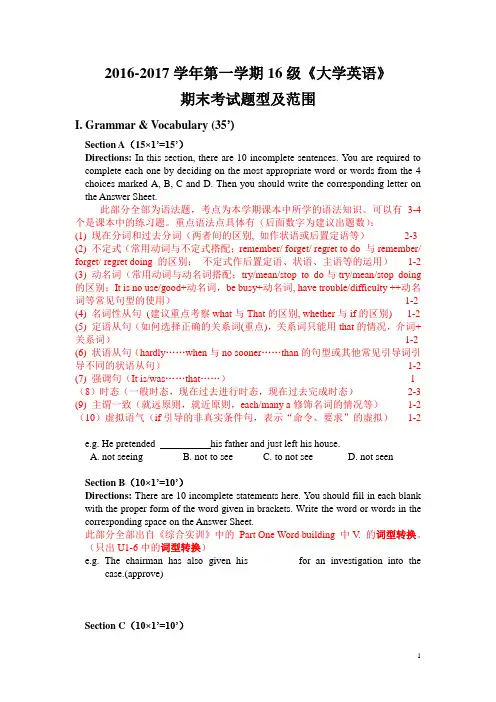
2016-2017学年第一学期16级《大学英语》期末考试题型及范围I. Grammar & Vocabulary (35’)Section A(15×1’=15’)Directions: In this section, there are 10 incomplete sentences. You are required to complete each one by deciding on the most appropriate word or words from the 4 choices marked A, B, C and D. Then you should write the corresponding letter on the Answer Sheet.此部分全部为语法题,考点为本学期课本中所学的语法知识。
可以有3-4个是课本中的练习题。
重点语法点具体有(后面数字为建议出题数):(1) 现在分词和过去分词(两者间的区别, 如作状语或后置定语等)2-3(2) 不定式(常用动词与不定式搭配;remember/ forget/ regret to do 与remember/ forget/ regret doing 的区别;不定式作后置定语、状语、主语等的运用)1-2 (3) 动名词(常用动词与动名词搭配;try/mean/stop to do与try/mean/stop doing 的区别;It is no use/good+动名词,be busy+动名词, have trouble/difficulty ++动名词等常见句型的使用)1-2(4) 名词性从句(建议重点考察what与That的区别, whether与if的区别) 1-2(5) 定语从句(如何选择正确的关系词(重点),关系词只能用that的情况,介词+关系词)1-2 (6) 状语从句(hardly……when与no sooner……than的句型或其他常见引导词引导不同的状语从句)1-2 (7) 强调句(It is/was……that……) 1 (8)时态(一般时态,现在过去进行时态,现在过去完成时态)2-3 (9) 主谓一致(就远原则,就近原则,each/many a修饰名词的情况等)1-2 (10)虚拟语气(if引导的非真实条件句,表示“命令、要求”的虚拟)1-2e.g. He pretended his father and just left his house.A. not seeingB. not to seeC. to not seeD. not seenSection B(10×1’=10’)Directions: There are 10 incomplete statements here. You should fill in each blank with the proper form of the word given in brackets. Write the word or words in the corresponding space on the Answer Sheet.此部分全部出自《综合实训》中的Part One Word building 中V. 的词型转换。
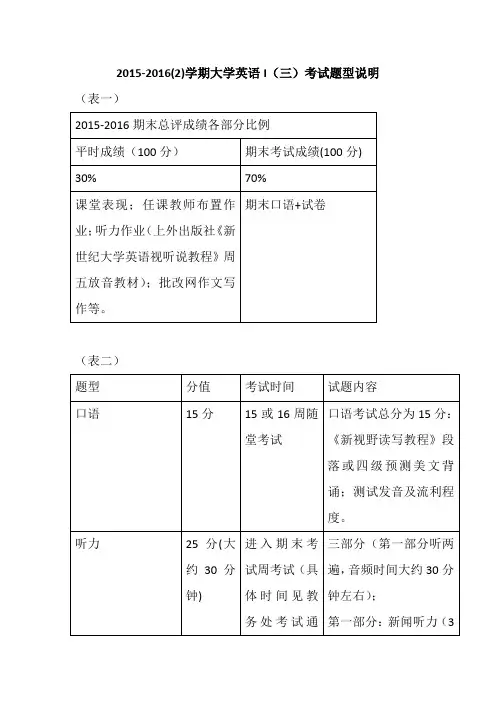
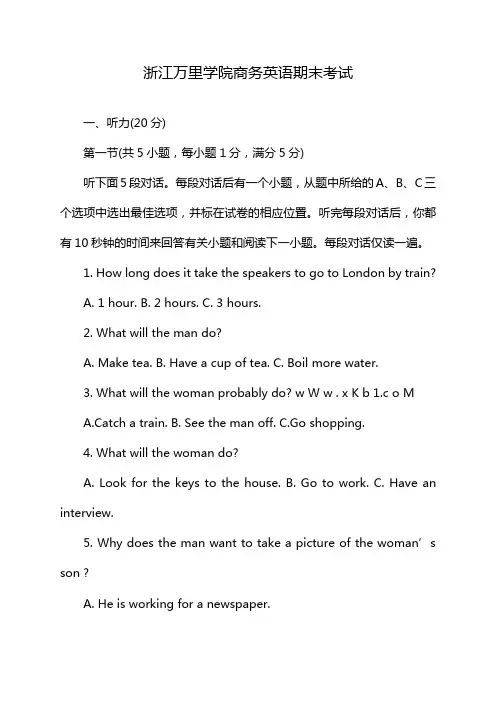
浙江万里学院商务英语期末考试一、听力(20分)第一节(共5小题,每小题1分,满分5分)听下面5段对话。
每段对话后有一个小题,从题中所给的A、B、C三个选项中选出最佳选项,并标在试卷的相应位置。
听完每段对话后,你都有10秒钟的时间来回答有关小题和阅读下一小题。
每段对话仅读一遍。
1. How long does it take the speakers to go to London by train?A. 1 hour.B. 2 hours.C. 3 hours.2. What will the man do?A. Make tea.B. Have a cup of tea.C. Boil more water.3. What will the woman probably do? w W w . x K b 1.c o MA.Catch a train.B. See the man off.C.Go shopping.4. What will the woman do?A. Look for the keys to the house.B. Go to work.C. Have an interview.5. Why does the man want to take a picture of the woman’s son ?A. He is working for a newspaper.B. He is taking photos for a book.C. The woman’s son is very lovely.第二节 (共15小题;每小题1分,满分15分)听下面5段对话或独白。
每段对话或独白后有几个小题,从每题所给的A、B、C三个选项中选出最佳选项,并标在试卷的相应位置。
听每段对话或独白前,你将有时间阅读各个小题,每小题5秒钟;听完后,各小题将给出5秒钟的作答时间。
每段对话或独白读两遍。
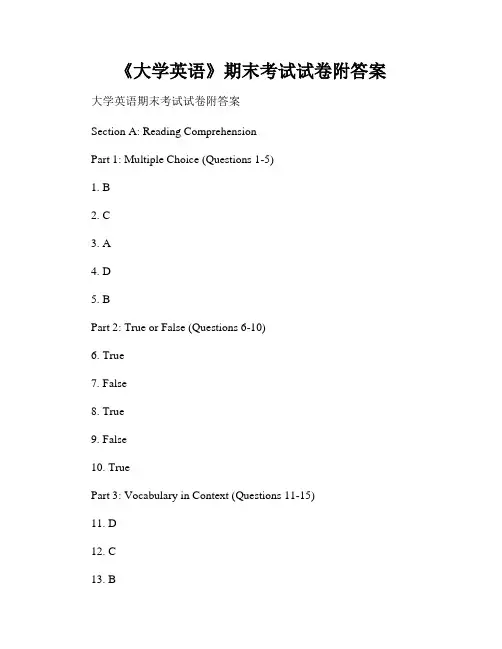
《大学英语》期末考试试卷附答案大学英语期末考试试卷附答案Section A: Reading ComprehensionPart 1: Multiple Choice (Questions 1-5)1. B2. C3. A4. D5. BPart 2: True or False (Questions 6-10)6. True7. False8. True9. False10. TruePart 3: Vocabulary in Context (Questions 11-15)11. D12. C13. B14. A15. CSection B: WritingPart 1: Short Answer Questions1. What is the topic of the passage?The passage discusses the benefits of exercise for overall health and well-being.2. What are the three main benefits of exercise mentioned in the passage?The three main benefits of exercise mentioned in the passage are physical health, mental health, and social interaction.3. How can regular exercise improve physical health?Regular exercise can improve physical health by strengthening muscles and bones, increasing cardiovascular fitness, and reducing the risk of chronic diseases.4. How does exercise contribute to mental well-being?Exercise can contribute to mental well-being by reducing stress and anxiety, improving mood, and boosting self-confidence.5. Why is social interaction important for overall well-being?Social interaction is important for overall well-being as it helps to reduce feelings of loneliness and isolation, improves social skills, and provides a sense of belonging.Part 2: EssayRegular Exercise for a Healthy LifeRegular exercise is crucial for maintaining a healthy and balanced lifestyle. It offers numerous physical, mental, and social benefits that contribute to an overall sense of well-being. In this essay, we will explore the importance of regular exercise and its positive impact on our lives.Firstly, regular exercise plays a vital role in improving our physical health. Engaging in physical activities such as running, swimming, or cycling helps to strengthen our muscles and bones. It also enhances cardiovascular fitness, leading to a reduced risk of heart diseases and other chronic conditions. Furthermore, exercise promotes weight management and helps to prevent obesity, a growing problem in modern society.In addition to physical health, exercise greatly contributes to our mental well-being. Engaging in exercise releases endorphins, often referred to as the "feel-good" hormones, which elevate our mood and reduce stress and anxiety. Regular exercise can also alleviate symptoms of depression and improve overall cognitive function. It provides an opportunity for self-reflection and relaxation, acting as a positive outlet for coping with life's challenges.Furthermore, exercise offers a platform for social interaction, which is crucial for our overall well-being. Participating in group activities, such as team sports or fitness classes, allows us to connect with others who share similar interests. These social interactions foster a sense of belonging and camaraderie, reducing feelings of loneliness and isolation. Moreover,exercise can serve as a bonding activity among friends, family members, or colleagues, leading to stronger relationships and increased social support.To conclude, regular exercise is essential for a healthy and fulfilling life. It not only improves physical health and fitness but also enhances mental well-being and fosters social connections. Incorporating exercise into our daily routines should be a priority for everyone, regardless of age or fitness level. So, let's make a commitment to prioritize our health and embrace regular exercise for a happier and healthier future.。
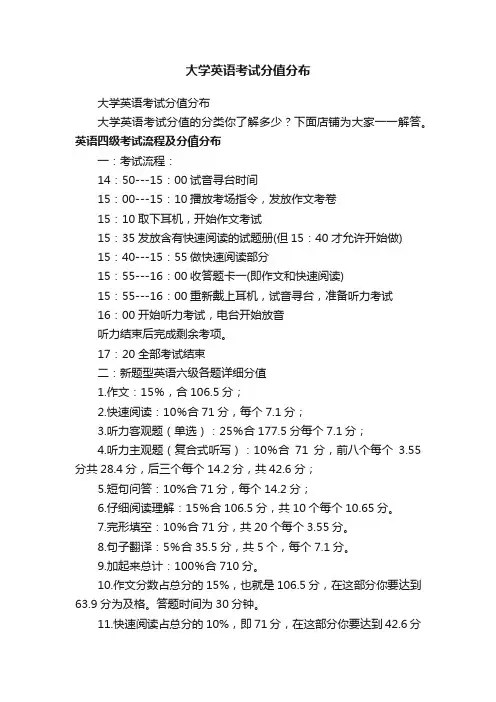
大学英语考试分值分布大学英语考试分值分布大学英语考试分值的分类你了解多少?下面店铺为大家一一解答。
英语四级考试流程及分值分布一:考试流程:14:50---15:00试音寻台时间15:00---15:10播放考场指令,发放作文考卷15:10取下耳机,开始作文考试15:35发放含有快速阅读的试题册(但15:40才允许开始做)15:40---15:55做快速阅读部分15:55---16:00收答题卡一(即作文和快速阅读)15:55---16:00重新戴上耳机,试音寻台,准备听力考试16:00开始听力考试,电台开始放音听力结束后完成剩余考项。
17:20全部考试结束二:新题型英语六级各题详细分值1.作文:15%,合106.5分;2.快速阅读:10%合71分,每个7.1分;3.听力客观题(单选):25%合177.5分每个7.1分;4.听力主观题(复合式听写):10%合71分,前八个每个3.55分共28.4分,后三个每个14.2分,共42.6分;5.短句问答:10%合71分,每个14.2分;6.仔细阅读理解:15%合106.5分,共10个每个10.65分。
7.完形填空:10%合71分,共20个每个3.55分。
8.句子翻译:5%合35.5分,共5个,每个7.1分。
9.加起来总计:100%合710分。
10.作文分数占总分的15%,也就是106.5分,在这部分你要达到63.9分为及格。
答题时间为30分钟。
11.快速阅读占总分的10%,即71分,在这部分你要达到42.6分为及格分。
题号为1-10题,答题时间为15分钟。
12.听力部分占总分的35%,即248.5分,在这部分的及格分为149.1分。
题号为11-35题,答题时间为35分钟。
13.是一篇篇章词汇理解和两篇传统的阅读理解,总分数为177.5分。
在这部分你要达到106.5分为及格分。
题好为36-66。
答题时间为25分钟。
14.是完形填空(极大可能考这个),占总分的.10%,即71分,在这部分你要达到42.6分及格。
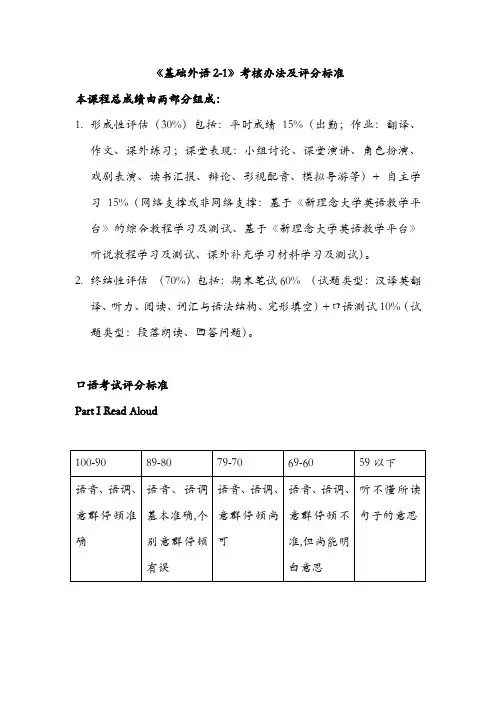
《基础外语2-1》考核办法及评分标准本课程总成绩由两部分组成:1.形成性评估(30%)包括:平时成绩15%(出勤;作业:翻译、作文、课外练习;课堂表现:小组讨论、课堂演讲、角色扮演、戏剧表演、读书汇报、辩论、影视配音、模拟导游等)+ 自主学习15%(网络支撑或非网络支撑:基于《新理念大学英语教学平台》的综合教程学习及测试、基于《新理念大学英语教学平台》听说教程学习及测试、课外补充学习材料学习及测试)。
2.终结性评估(70%)包括:期末笔试60% (试题类型:汉译英翻译、听力、阅读、词汇与语法结构、完形填空)+口语测试10%(试题类型:段落朗读、回答问题)。
口语考试评分标准Part I Read AloudPart II Answering Questions & Part III Describing Pictures笔试试卷答案Part I TranslationT1 Suddenly I wanted to write about that, about the warmth and good feeling of it, but I wanted to put it down simply for my own joy, not for Mr. Fleagle.T2 The world today is filled with dangers, hence the sick joke that the reason we have not been contacted by an alien civilization is that civilizations tend to destroy themselves when they reach our stage.T3 They found the farm green with vegetables, the little house livable and homey. There was a tractor and a good car in the yard.T4 Suppose I’m beautiful. I’d always be haunted by the feeling that you had been taking a chance on just that, and that kind of love would disgust me.T5 Chantek figured out that if he did tasks like cleaning his room, he’d earn coins to spend on treats and rides in Miles’s car.《基础外语2-2》考核办法及评分标准本课程总成绩由两部分组成:1.形成性评估(30%)包括:平时成绩15%(出勤;作业:翻译、作文、课外练习;课堂表现:小组讨论、课堂演讲、角色扮演、戏剧表演、读书汇报、辩论、影视配音、模拟导游等)+ 自主学习15%(网络支撑或非网络支撑:基于《新理念大学英语教学平台》的综合教程学习及测试、基于《新理念大学英语教学平台》听说教程学习及测试、课外补充学习材料学习及测试)。
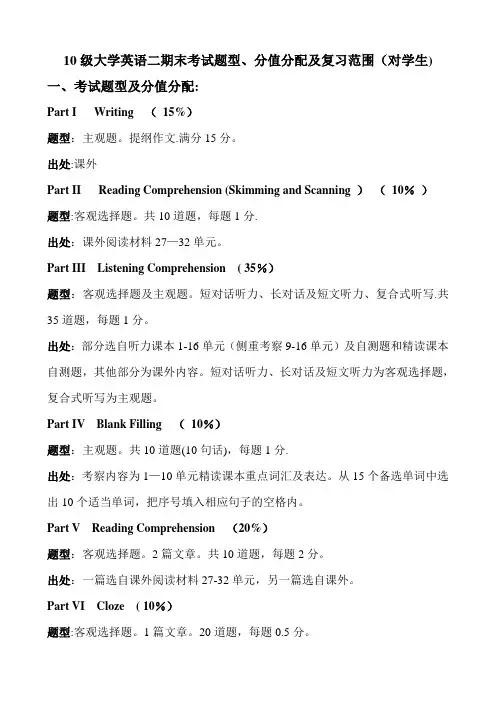
10级大学英语二期末考试题型、分值分配及复习范围(对学生) 一、考试题型及分值分配:
Part I Writing (15%)
题型:主观题。
提纲作文.满分15分。
出处:课外
Part II Reading Comprehension (Skimming and Scanning )(10%)
题型:客观选择题。
共10道题,每题1分.
出处:课外阅读材料27—32单元。
Part III Listening Comprehension ( 35%)
题型:客观选择题及主观题。
短对话听力、长对话及短文听力、复合式听写.共35道题,每题1分。
出处:部分选自听力课本1-16单元(侧重考察9-16单元)及自测题和精读课本自测题,其他部分为课外内容。
短对话听力、长对话及短文听力为客观选择题,复合式听写为主观题。
Part IV Blank Filling (10%)
题型:主观题。
共10道题(10句话),每题1分.
出处:考察内容为1—10单元精读课本重点词汇及表达。
从15个备选单词中选出10个适当单词,把序号填入相应句子的空格内。
Part V Reading Comprehension (20%)
题型:客观选择题。
2篇文章。
共10道题,每题2分。
出处:一篇选自课外阅读材料27-32单元,另一篇选自课外。
Part VI Cloze ( 10%)
题型:客观选择题。
1篇文章。
20道题,每题0.5分。
出处:根据1—10单元课文内容或课后练习改编。
大学英语期末考试题型及复习范围(优秀范文5篇)第一篇:大学英语期末考试题型及复习范围期末考试题型及复习范围读写:100分,105分钟 paragraph writing(段落写作,不少于80个词,15分,25分钟,unit 1-6 writing skills)2 fast reading (10分,10分钟,一篇文章,7个判断,3个填空,快速阅读2)3 reading comprehension(三篇文章,30分,25分钟,15*2,课外)4 vocabulary & structure(25分,30分钟)section A: multiple choice(单选,10分,20*0.5,课内重点词汇)section B: filling-in(填空,12选10,10分,10*1,课后练习,原题)section C: replacement(替换,5分,5*1,课内重点词组)translation(翻译,20分,15分钟,5*4,其中3题英译汉,课文原句;2题汉译英,课件翻译练习)听力:100分,30分钟short conversation(短对话,20分,10*2,课外)passage listening(篇章听力,2篇,20分,10*2,新视野视听说1)3 long conversation(长对话,2个,20分,10*2,课外)4 true/false(判断,10分。
5*2,新视野视听说1)spot dictation(听写填空,30分,10*3,新世纪听说1,city living,非原题)口语:15分,考试时间为17-18周听说课 read the words aloud (5分,读写课本1-6单元课文单词10个)2 read the text aloud(5分,读写课本1-6单元课文随意抽一段)answer the questions(5分,6组问题,topic来自听说课本1-6单元)注意事项读写和听力考试的考试顺序为先考写作,再考听力,然后考读写的其他部分 2 凡涉及读写课本即包括1-6单元的A和B两篇课文听力考试除最后一部分听写填空放三遍以外,全部都只放一遍4 黑体字加粗部分会提供类似题目供大家练习新视野视听说1的内容在自主学习网站上可以找到,在1-6单元中的listening in和further第二篇:期末考试题型及复习范围期末考试题型及复习范围题型:Part onevocabulary and Structure50题,每题1分Part twoReading Comprehension2篇文章,10题,每题1分Part threeCloze1篇文章,10题,每题1分Part fourTranslation1篇英译汉,10分5个汉译英句子,每个句子4分复习范围:第一部分词汇与结构P127,P270 词汇与结构题第二部分阅读理解P121-124P266-269第三部分完型填空P58P273(只有10个空填词)第四部分翻译英译汉第一、三单元,每单元前三段。
石桥二小2012~2013学年第一学期期末统一测试工作意见为了解本学期学生对各学科知识掌握情况,经研究,对我校一~六年级学生进行素质调研检测。
现结合我校具体情况,作如下考务工作安排:1、 领导小组组 长:周家强副组长:李 海 王晓兵组 员:李大成 张斌 尚延亮 张会金 白文志 苏宜海 吕继强 苏鑫二、考试时间及科目:日期科目年级上午年级下午1月23日语文四~六年级8:00~9:20一~二年级三年级1:30~2:101:30~2:30数学四~六年级9:35~10:35一~二年级三年级2:45~3:252:45~3:45英语四~六年级10:50~11:40三年级4:00~4:40三、具体要求如下:1、请所有监考老师及考场负责人认真负责,自觉履行监考职责,特别是英语考试更要认真负责,做到操作规范,音量适中,确保听力考试顺利进行。
非监考人员不得进入考场。
(各完小自行准备手提电脑,做好个人标记)2、监考老师要提前半小时到达指定考点点名,督考人员召开考前考务会议,提前10分钟进入考场、提前五分钟分发试卷。
要提醒学生填好自己的学校、班级、姓名、编号。
教师在监考的过程中要及时发现学生在考试过程中有无试卷错误等特殊情况,并报告督考人员,更换备用卷。
如有语文听力题,监考教师要做到声音洪亮、发音准确、吐字清楚、语速适中。
监考过程中不得随便走动、闲谈及做与监考无关的事,考试期间中午不得喝酒。
每个考场的两位监考教师一前一后,前者始终面对学生站立。
收卷要及时,仔细核对参考人数,按编号从小到大顺序整理好试卷。
3、所有考生必须按照中心校制定的座位号顺序座,任何人不得擅自调动学生座位顺序或变更学生姓名,在监考及录分过程中如发现有错位顺序,按照奖惩条例对相应责任人给予处罚。
(各完小一定严格执行)4、各完小校长负责本考点的信号、草稿纸等考务用具,考场门前放一张课桌,学校要准备好与电脑相连接的音箱,并要调试好电源及音箱。
5、各校要提前安排好考场,排好桌凳,保证学生每人一桌一凳,学生按照下发的顺序头尾相接依次坐位。
大学英语试题说明(推荐5篇)第一篇:大学英语试题说明题型说明一:听力部分(20分)听力部分共三个部分:Section A: Questions(1%*5=5%)Section B: Short Dialogues(1%*5=5%)Section C: Spot Dictation(2%*5=10)共计l5小题.占总分的20%:(1%*5+1%*5+2%*5=20%)测试时间为15分钟。
二:阅读(40分)第一部分:长篇阅读Directions: Go over the passage quickly and answer the questions.Identify the paragraph which contains the following information and write the correct paragraph number.将段落序号与题目中所含信息相匹配。
第二部分:深入阅读阅读理解共3篇,每篇5道题,共计15小题,每道题2分,占总分的30%(15*2=30)测试时间为40分钟。
三:词汇部分(15分)Directions: Match the words and expressions with their definitions.根据定义从给出的词中进行匹配。
共计15小题,每道题1分,占总分的15%(15*1=15)四:翻译题型说明(10分)根据中文提示填写英文表达。
共5题,每题2分,占总分的10%(5*2=10)五:作文题型说明(15分)从三篇作文中任选一篇,总分15分(1*15=15)第二篇:大学英语试题1.M: Did you go to the match on Saturday?W: No,I listened to the commentary instead.It sounded pretty exciting,I must say.Q: What are they talking about? 2.M: Two six two four three double four.Charles Farmer speaking.W: Hello,Charles,it's Joan-Joan Cook.Q: What kind of talk is this?3.M: I have written five books,You know.W: But you should have written six books.Q: How many books have the man written?4.M: Linda is coming by train.Let's go to the railway station.W: OK,but I must wash the dishes first.Q: Can the woman get to the station?5.M: You speak Chinese quite well.How long did you study the language?W: I studied it in a college for two years.Then I was sent to China and worked there for three years.Q: How long did the woman study Chinese?6.W: I want to go shopping.Can you come with me, please.You can help me carry the things.W: Certainly,dad.Do you have the shopping basket? Q: Where will they go?7.M: I'll give a thorough checkfirst open your month and show me your tongue.W: Is there anything wrong?Q: Where does this conversation most likely take place?8.M: How long have you been in America?W: I arrived one month ago,I will stay here for one year.Q: When will the woman leave?9.M: How do you spend your weekend?W: I usually go shopping or go fishing or go to a movie.Q: Which is not mentioned in the conversation?10.M: If you buy this blouse,you'll save five dollars.It's only twenty-one dollars.W: But I want a small size.So could you handme the eighteen-dollar blouse? Q: How much did the woman plan to pay for the blouse?Passage OneMy friend Wilfred works in the post office.He is a good sportsman and so he belongs to the Monta Sports Club.Three months ago Wilfred made a money-box.He got a flat box,and he coloured it white.He cut a slit on the top of the box.He wrote these words on the box,in big letters.WILL YOU HELPThat was all.He did not write his name,or any name.The words were just---WILL YOU HELPWilfred took the money-box to the club.He put it on a table,just inside the door.Every Friday evening he opens the box.I do not belong to Monta Sports Club.but I went there last Friday evening with Wilfred.He opened the money-box and took out the money“Not bad,”he said “Between two and three poundsHe shut the box then,and put it back on the table.The money went into Wilfred's pocket ”People are kind,“ Wilfred said ”They like to help.They like to give some money away.“"Are you going to keep the money?” I asked.Yes.I'm not a rich man,and that box is mine.“I said,”Doesn't anyone ever ask questions about it?“"No.They help or they don't help.They never ask questionsPeople don't like to ask questions about money.”Questions:11.What does a money-box always have?12.How often does Wilfred open the box?13.Why does Wilfred leave the box near the club door?14.People put money in the box.Whom are they helping?Passage TwoIt is ten o'clock at night ]and you are outdoor.You can see many points of light in the sky.They are stars.Each star is anothersun.The sky is big,and it has many sun.Our Sun is near to us.It warms us and gives us light in daytime.The stars are not near.We can see their light only at night and they do not warm us.The stars are not all the same.Many stars are quite like our Sun.They are of the same size and they have the same color----yellow.Other stars are bigger or smaller.A “giant” star is very, very big.A “dwarf” is a small star--smaller than the sun.Stars have different colours too.They can be red,orange,yellow,white or blue.here are giants and dwarfs in all these colours.All stars are,of course,very hot.The hottest stars are the blue ones.White stars come next they are less hot then yellow and orange stars are less hot again red stars are the least hot.And they are also the oldest stars.Questions:15.We don't see stars in the daytime.Why?16.What colour are the hottest stars?17.As what do we see the stars?Passage ThreeWhat you hear is only a recording of the movie.The theater is closed.T oday's movie is The Godfather Part II winner of six Academy Awards---Oscar AwardThere will be continuous showings at two-thirtyfive o'clock,seven-thirty,and ten o'clock.The movie is rated PD.Tickets are two-fifty for adults and half price for cildren under sixteen.If you need more information the theater will be open at two o'clock.Please call back at that time.Questions:18.What time does the last show start?19.How much does a ticket for a child under sixteen cost?20.When did the speaker say that the theater would be open? 第三篇:大学英语试题(6作文)第六部分:作文(满分15分)1.根据下面所给的题目和中文提纲写一篇不少于80字的短文。
期末考试题型题量和分值分布情况说明考试时间:12月27日(周四)下午1:30—3:00考试地点:博学楼301考题共13页,分为四大部分,共有10类题目。
第一大部分为词汇考查部分,重点考查词干、词缀知识和词型变换,共25分第一题的要求如下:Directions: Using the answer line provided, complete each italicized word in the sentences below with the correct word part from the box. (5 points)在方框内会给出10个词干和词缀,然后会有10个句子,其中某个词会扣掉其中的一个词干或词缀,要求根据句子提供的上下文选出合适的词干和词缀使这个词和这句话都完整起来。
每个词干或词缀0.5分,共5分。
写答案时只写填的词干或词缀部分即可,不用把整个单词抄全。
(我们在TAS平台上放过这样的一篇练习)第二题的要求如下:Directions: Match the following underlined words in each sentence with their definitions Make use of the contexts provided and the word formation knowledge you have. (8 points)这是词意搭配题。
这一部分会给出8个句子,每句中挑出一个词,并给出8个定义,要求根据所提供的上下文和定义里面出现的某一关键词干和词缀快速选出每个词的定义。
每词1分,共8分。
第三题的要求如下:Directions: Fill in the blank with a word that both defines the boldfaced word part and makes sense in the sentence. (4 points)该部分仍然考查我们对词干和词缀的理解。
大学英语期末考考试题及答案评分标准大学英语期末考考试题及答案第一部分交际用语(共计10分,每小题2分)1.D2.D3.A4.C5.B第二部分词汇与结构(共计20分,每小题2分)6.B7.A8.C9.B10.C11.D12.D13.B14.C15.A第三部分完型填空(共计20分,每小题2分)16.A17.C18.B19.A20.C21.D22.B23.D24.C25.A第四部分阅读理解(共计30分,每小题2分)26.C,27.D28.B29.B30.A31.B32.A33.D34.B35.C36.F37.F38.T39.NG40.T第五部分书面表达(20分)Sample:Dear Robert ,Im very pleased to accept the kind invitation you extended in your last email. Im planning to spend my holiday in Britain next week. Sincethis is my first visit to your country, I hope you will be able to meet me at the airport. My flight details -- the plane leaves Beijing at 1230 next Thursday and arrives in London at 14 30 (local time). The flight number is CA1347. Thank you and looking forward to meeting you in London. With best wishes.Zhang Lin大学英语考试题答案及评分标准一、阅读下面的小对话,从A、B、C、D四个选项中选出一个能填入空白处的最佳选项,并在答题纸上写出所选的字母符号。
新视野/新时代平台问题及大学英语期末考试范围说明1.关于新视野平台测试成绩的说明各位老师,新视野平台的第一次测试成绩在第9周从第一册升级到第二册(B班)或第二册升级到第三级(A班)的过程中,由于系统原因,导致第一次测试成绩未能保存。
后来各位老师反映,还未完成相应级别的教学,学生还需要使用新视野平台学习,所以又请管理员老师进行了相应级别的恢复。
在第十三周周一,教学部请管理员老师统一升级新视野平台:B班从第一册升级到第二册,A班从第二册升级到第三级。
请老师们在第十三周至十七周期间为学生在新视野平台上出本学期的第二个测试题。
此次测试的成绩作为新视野测试平时成绩,占平时成绩的10%。
如果老师们已经保存第一次测试成绩的,则按照以前的惯例,每次测试占平时成绩的5%。
2. 新时代的升级根据本学期的工作安排,新时代第二次成绩统计时间为第13周周一,到时统计成绩的老师也会相应导出数据,进行计算。
请所有老师在第13周周一登录新时代平台,为学生完成批量升级:B班从新时代第一册升级到第二册,A班从第二册升级到第三级。
特殊情况:已经提前完成第一册(B班)和第二册(A班)13个单元所有学习任务及总测试的个别学生,系统已自动升级到下一级别,请老师注意在批量升级时,不要再为这部分学生升级了。
3. 大学英语期末考试范围及题型考试范围:所有已学单元课文A及其课后练习是考查重点;写作是社会热点话题,与课文A内容相关; 选词填空、完型填空为课文A课后练习中的对应原题; 翻译题来自开学初拷给大家的自主学习包中的翻译题,每周对应一个翻译练习。
题型:Part I Writing (15 points) 社会热点话题(与课文内容相关)Part II Reading Comprehension (Skimming and Scanning) (10 points) (1*10) 快速阅读(课外)Part III Listening Comprehension (35 points) (课外)Part IV Reading Comprehension (Reading in Depth)Section A (5 points) (0.5*10)(课后原题)Section B (20 points) (2*10)(课外)Part V Cloze (10 points) (0.5*20)(课后原题,可能有改动。